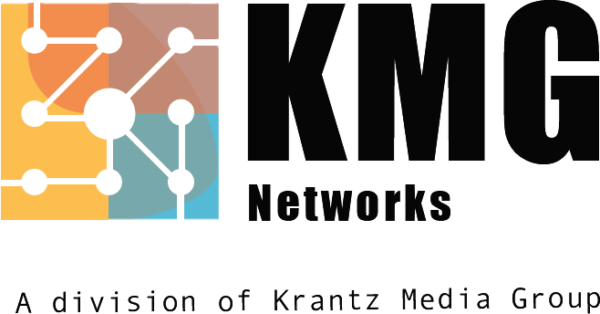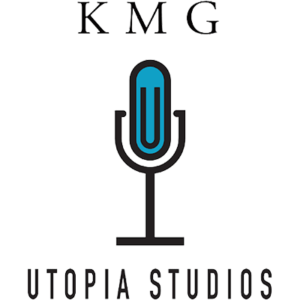The Toronto media veteran gives candid advice about asking “hard” questions and why it’s ok to cut an interview short.
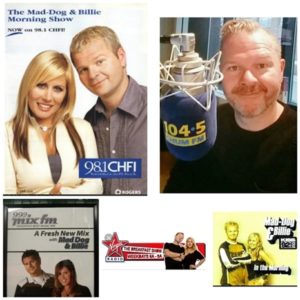 >Currently the co-host of Canada's biggest drive home talk radio show #TheRush on Newstalk1010 in Toronto. Jay “Mad Dog” Michaels is a celebrated Toronto radio veteran, who has dominated ratings with the biggest stations, and was twice voted "favourite Toronto radio personality." So if your favourite actor or musician or newsmaker has been on air in Toronto, they have probably chatted with Mad Dog. We are privileged to have him join us for an interview about interviews.
>Currently the co-host of Canada's biggest drive home talk radio show #TheRush on Newstalk1010 in Toronto. Jay “Mad Dog” Michaels is a celebrated Toronto radio veteran, who has dominated ratings with the biggest stations, and was twice voted "favourite Toronto radio personality." So if your favourite actor or musician or newsmaker has been on air in Toronto, they have probably chatted with Mad Dog. We are privileged to have him join us for an interview about interviews.
How do you prepare for an interview?
Take a look at what they have talked about before.
This seems like the simplest thing in the world and it might seem like it's almost cheating but it's really not. If you are interviewing anybody, they have been interviewed before. So watch the interviews. Read the interviews that they've already done. It allows you to
get a glimpse into what they respond to, and what they don't respond to.
I was interviewing Nelly Furtado. When I was researching and watching interviews. I noticed that she had done her new song on a Portuguese variety show with a huge band and I also saw her do the same song solo in english. I said right out of the gate, “actually one of the things i love about your single is you are just as comfortable on stage by yourself, as you are when you’re singing in portuguese, on tv in front of three million people”. That immediately tells her that this guy does his research. This guy is paying attention. This guy's plugged in and then they immediately get relaxed a little bit.
So the biggest thing for me is I watch, I read, I know the subjects.
What should be the goal of a good introduction?
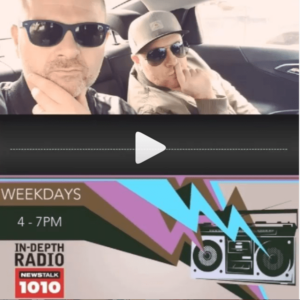 They are talking to you for a reason, get to it.
They are talking to you for a reason, get to it.
When you were interviewing someone they generally have something they're selling. Always fit that into the beginning of the interview. For instance, you know if you're going to talk to a musician you can start with the name of the new album. You might say this is where it’s available for streaming or downloading. Get the stuff that they need to sell out of the way first, in maybe the first or second question.
What do you think makes for a good interview?
You don’t have long to engage the audience.
It should hook you in the first sixty seconds. You can tell in the first sixty seconds whether or not the interest is there, for the artists and the interviewer. Chances are you're not gonna listen to the interview unless you're already interested in the person and they are being interviewed by someone who is engaged.
What are common mistakes that people should be aware of?
Not Listening.
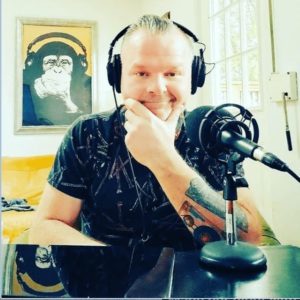 So often people are conducting an interview and they're so concerned about getting the questions right and they're not really listening to the answers. What I tend to do is, I'll just write down an intro and then four or five questions. I may only use the first question. I might get to all five questions. But only by listening can I know which question should be next. Or if I should ask a follow up question that maybe I didn’t write. Yeah, an interview is bad because someone isn’t listening or is not prepared.
So often people are conducting an interview and they're so concerned about getting the questions right and they're not really listening to the answers. What I tend to do is, I'll just write down an intro and then four or five questions. I may only use the first question. I might get to all five questions. But only by listening can I know which question should be next. Or if I should ask a follow up question that maybe I didn’t write. Yeah, an interview is bad because someone isn’t listening or is not prepared.
What do you do when an interview is going badly?
Don’t be afraid to pull the plug.
End it. Yeah because I mean if I'm there and I'm engaged and you're there and you're not engaged. I'm not gonna waste your time, if you don't want to be there. I'll just “thank-you that’s all I’ve got:” And half the time, they will actually perk right up and say, “oh actually do you want to ask me about this or that?”. Or they will just say “great thank you” because they didn't want to do the interview anyway. If they don’t want to be there, if they don’t want to be professional, then don’t waste your time.
What’s your advice for when you have to ask a difficult question?
You can ask anything you want
What’s interesting is that I have been on both sides of it. I worked in music radio, and I work in hard news. The only difference between a hard question in music and a hard question in news is you're not allowed to ask a hard question in music. If you ask a hard question in music, then the publicist will pull the artist, and you will get in trouble. So, you’re not allowed to ask them about a bad break-up or an arrest. In news, you can ask all the hard questions you want. You’re just never going to get an answer. So one way to look at it is, there are no hard questions. At least not any that will get answered.
What’s your advice for a podcaster, who wants to get better?
Can you make the subject relatable?
You can't just go into it without a plan. It may change, you may have to adapt. But a lot of great podcasts had to change before they found their audience. You need to give it time until you find your niche. Make sure you’re not just doing a podcast for the sake of doing a podcast. Try to find the most human way to talk about whatever your subject is. This job is about talking to interesting people, about interesting things. But it’s when you can make the subject human and relatable that you're doing your best.
Blue Jays fans everywhere know the voice of Mike Wilner. For eighteen seasons he has brought the game and it’s stars to radios across Canada. Since starting his career in the late 80’s, he has been talking to, and about, athletes in every sport. From spring training in Dunedin, Florida to the Winter Olympics in Whistler, British Columbia, from aspiring amateurs to legendary professionals, Mike Wilner has talked to them all. So we are very fortunate that he can join us for an interview about interviews.
How do you prepare for an interview?
Go with what you know.
Really good question because often I don't. Generally my preparation is based mostly on living the daily life of the baseball season. I know what to ask from having watched the last game, and having been around them all season. If I want to talk about a specific thing that happened in the past I'll look it up but I've gotten pretty good at knowing those kinds of things generally. When doing long form interviews with former Blue jays, I’ll go back and confirm that I remember certain events the way that it actually happened.
What should be the goal of a good introduction?
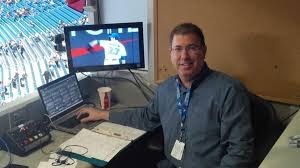 Stick to “who” and “what”.
Stick to “who” and “what”.
When you introduce somebody you want to let your audience know who they are and what they've done but you don't wanna take any of their stories that way. I think it should be super short. It should be this is who I'm talking to and this is what we are talking about.
What do you think makes for a good interview?
Put yourself in the listeners place.
I think that the job of an interviewer is to stay out of the way. The most interesting interviews or the one where the subject is doing ninety percent of the talking, and the interviewer just draws things out and listens along with the audience. If you're listening, and thinking “I want to find out more about this subject” and they ask about that subject, than you are doing the right thing as an interviewer.
What are common mistakes that people should be aware of?
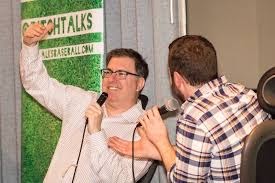
Remember why your audience is listening.
I mean it is like a flip of a coin. Making it too much about the interviewer and not enough about the subject. They're not there to hear about you or about your life. They're here for the person you are interviewing. Don't interject your own experiences. Don’t steal their thunder. Don't tell their stories for them.
What do you do when an interview is going badly?
Ask about their pets or hobbies.
Generally for me, if it is a bad interview it's because I'm getting one word answers. It’s your job to make them more comfortable, and to find a way to make them talk about themselves. Most people are actually uncomfortable sitting down to talk about themselves. So maybe take the subject off of them at least for a moment. See if you can get them to open up a little bit try it from a different perspective, from a different angle.
What’s your advice for when you have to ask a difficult question?
It’s part of the job.
To be up front about don't try to hide it, don't try to sneak it in. Don’t look for a “got ya”,or anything like that. I'm very upfront about it. I just say, “look I wouldn't be doing my job if I didn't ask you this” and then I ask what needs to be asked. I don't talk to the politicians or world leaders. I talk to athletes, I work in the toy department. So the most difficult question I generally have to ask is about a mistake that I believe has cost their team.
What’s your advice for a podcaster, who wants to get better?
Want to get better? Repetition.
The most important thing is, the more you do something the better you will get at it. I'm a veteran interviewer now but I was very different thirty years ago. Because you figure out what works for you and what doesn't, and that's what gets you better. Work at it as often as possible
@Wilnerness590
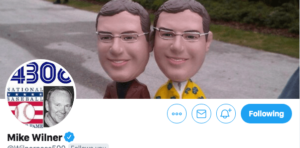
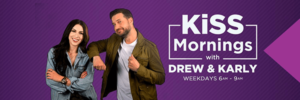
Drew Kozub has been front and center in Winnipeg media since 2011. First with Breakfast Television Winnipeg, and now with KiSS Mornings on 102.3 FM. If you mix in his 6 years as the in-Game Co-host for the NHL's Winnipeg Jets. Then, basically he spends everyday talking to Winnipegers of all walks of life. So there are few people better suited to join us for an interview about interviews.
How do you prepare for an interview?
It starts before you start researching
There are two things that you wanna make sure that you're thinking of right at the beginning, before you even start doing your research. First, what do you want to get out of the interview? And second, what is going to be the most interesting from the audience's perspective?
Then think, “where can I go to find out that much about this person as possible?” Because the more that you know, the more it's going to inform your questions. And give you a much more interesting interview.
What should be the goal of a good introduction?
Get to the point
I think this is where a lot of people go wrong. The temptation for new interviewers is to want to make a great Impression. You want to show this person that you were interviewing how much you know, how much research you have done. Then they end up using everything they researched in the introduction. Leaving nothing left for the interview. Instead, be brief and just try to focus on getting right into the interview as quickly as possible.
What do you think makes for a good interview?
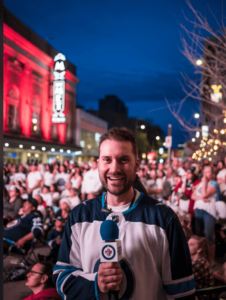 Get away from the prepared answers
Get away from the prepared answers
When somebody's getting interviewed they have certain expectations and they have practiced responses to what they think you are going to ask. I think a good interview is one where you start deviating from those stock answers. Sport is a good example you'll see athletes talking about the game and pretty much every single athlete has about the same answer. But sometimes I'll find a little twist or a little bit of a different question. In a hockey game for example if something happened during the warm-up and then you can get the player to talk about that and they don’t have a practiced answer. Now you can get into their personality rather than their persona for the interview.
What are common mistakes that people should be aware of?
Asking good questions means being a good listener
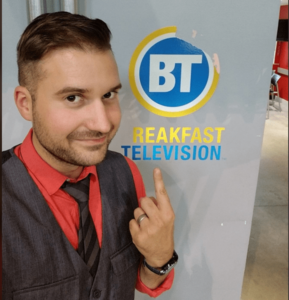 The number one most common mistake is not listening. A lot of people come up with their long list of questions, they ask the question and they wait for the person to finish answering and they move onto the next question. That seems like a good idea, but you miss so much opportunity if you're not listening carefully. If you ask your first question and while answering they say something that you weren't expecting, that can be a really fun opportunity. That answer could lead to something brand new that you didn't know, or maybe nobody knows, but if you're not listening to those answers you could miss it. Be brave. Go away from your script.
The number one most common mistake is not listening. A lot of people come up with their long list of questions, they ask the question and they wait for the person to finish answering and they move onto the next question. That seems like a good idea, but you miss so much opportunity if you're not listening carefully. If you ask your first question and while answering they say something that you weren't expecting, that can be a really fun opportunity. That answer could lead to something brand new that you didn't know, or maybe nobody knows, but if you're not listening to those answers you could miss it. Be brave. Go away from your script.
What’s your advice for when you have to ask a difficult question?
A little respect goes a long way
I think that some people would disagree, but I think if you're gonna be talking about a difficult subject I think that's very fair to warn the guest ahead of time. In my opinion it shows that you have a rapport and are showing respect. I think they're going to be more appreciative and give you more thoughtful responses. Whereas if you spring something on them, they might feel attacked. Then they are more likely to not answer at all. I think it's only fair to give up your guest a heads up, so they can at least be prepared.
What do you do when an interview is going badly?
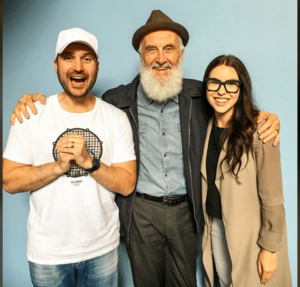 It can all be fixed in the editing suite
It can all be fixed in the editing suite
The most important thing to remember is that it's all going to be edited afterwards. It may
feel terrible but just keep on going to get what you can on tape, and later you can still end up with something that could have value for your audience. Even if it may not feel like it at the time
What’s your advice for a podcaster?
Don’t just think about it, do it
I think it's really important to figure out your niche, the thing that you really want to go after. I think a lot of podcasters try to go really broad in terms of subject matter, and end up with no one listening. If you are absolutely into Nintendo games that were released before 1995. You can go really deep and while there may not be a giant audience for that kind of podcast, the audience that is interested in those nintendo games is gonna absolutely love what you're doing. So figure out your passion and just go for it. And don’t just plan it. Actually go for it. Start recording and actually get it out there. Because if it's not out there no one can enjoy it. You can't get better, you can’t build your audience, if you don’t get out there and do it.
Twitter = @DrewKozub
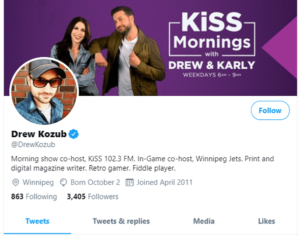
FaceBook - Drew Kozub
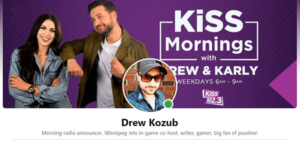
Instagram = DrewKozub

If you are Canadian and own a radio then you've heard the voice of Tarzan Dan. He's worked at the biggest stations in the country, winning numerous awards including announcer of the year multiple times. Plus, you can mix in six years as the host of the very influential show The Hit List on Ytv. To sum it up, if you have a favorite musician the odds are that they have been interviewed by Tarzan Dan. So we are very pleased to have him join us for an interview about interviews.
How do you prepare for an interview?
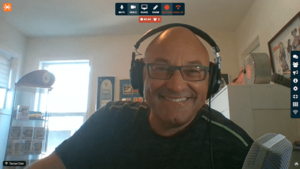 Leaving them asking, How?
Leaving them asking, How?
I actually will go back to what I've learned watching Larry King, he said "always find something that will leave them wondering, “how did they know that?” For instance when I interviewed Jennifer Lopez, one of the things with her was that she was a hairdresser. So I actually said, “how did you end up here? You wanted to be a hairdresser.” I asked her how my hair looked that day, did I do a good job? She laughed and put her hand on my head and a photo of the moment ended up on the front page of the National Post. Those are the little things that break down the celebrity wall by connecting with them personally.
Do you script or not script? What's your advice?
Be prepared, not scripted
I never script an interview. I will spend time writing bullet points or writing down info, but I’ve never scripted. It will all be bullet points so that if, say their mom had a birthday the other day. I may make a note that said “did you get a chance to see your mom for her birthday?” When you ask something like that, there is realism, versus a superficial approach. However, that style is not for everybody. It’s an interview style that I tried to hone and to develop. So don't be stealing my style, I need my job!
What’s your advice for when you have to ask a difficult question?
If you’re not sure….
Sometimes I think it can be avoided. I try to avoid having to go down that road, I don't think it's fair either, just because they're public figures doesn't mean that I can ask personal or intimate questions. There is a saying in radio “if you have to question it, don't do it”. I want them to have a good experience. I want them to want to be interviewed again. I want them to walk away and think “that guy is awesome, I want to talk to him again.”
What do you do when an interview is going badly?
Is the final product worthy of you?
I can count on one hand how many bad interviews I've had in my career. Most celebrities are very gracious and surprisingly down to earth. You know the funny thing is, the bigger the celebrity usually the nicer they are. Guys like Brian May from Queen, or John Bon Jovi, both really nice people. But in the end, you have the ability to control what you put out. If it's not worth it or it's not worthy of you, why air it?
What’s your advice for a podcaster?
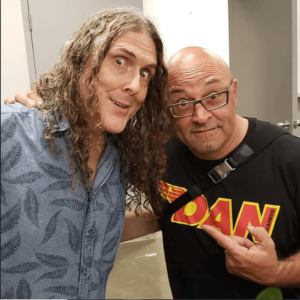 Talk about what you know
Talk about what you know
Find your niche. If you're a guy who fixes cars and you want to show people how to do that, then do that. You shouldn't be like baking bread on the engine 'cause that's just something completely different. So I think that that's the thing. You have to find what hits a chord with people. If you are authentic and if you're lucky, you can find a podcast that fills a void.
Twitter = @TarzanDan
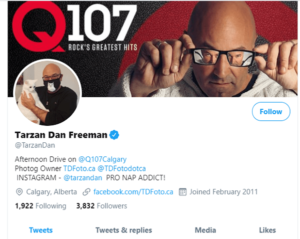
FaceBook = Tarzan Dan
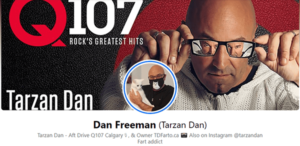
Instagram = tarzandan
What podcast style fits you best?
Your podcast. Your style. What fits you best?
You have something to say. You have ideas that need to be shared. You have a voice that needs to be heard. With Talkshoe, you have a way to make that voice be heard. But before you turn on that microphone, you might want to take some time to think about what you want to say, and how you would like that voice to be heard. This is your podcast style. It is a reflection of who you are and what you have to say. Here are six podcast styles that will make your content get heard.……..
#6 - Interview style:
"I let the American people down and I have to carry that burden with me for the rest of my life.”
Said by some dude to world famous interviewer Sir David Frost.
Interview style ....The style has been around since the beginning. Usually with one host calling on a guest to provide the content of the show. It can be a very labour intensive format, finding topics, researching, booking guests, and arranging interviews. It can be a lot of work, but it is also one of the most rewarding. An interview format allows you to speak to experts on your favourite topics and finally get the answers you have always wanted.
Talkshoe style example
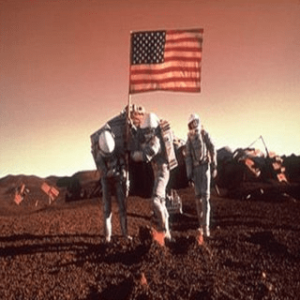
Our Next Giant Leap
Show ID: 75386
https://www.talkshoe.com/show/our-next-giant-leap
Tune in to "Our Next Giant Leap." A 15 minute monthly show that airs live the first Tuesday of every month on Talkshoe. It's a show about our next giant leap in human space exploration
#5 - Solo Style:
If you want something done right, do it yourself.
Charles-Guillaume Etienne, he lived during the French revolution and even then he knew you were the best person for the job.
Solo style . …It’s all on you, but that is a good thing. You know what you want to say and now you have a place to say it. You will experience the thrill of opening the mic and just letting it all out. No interrupting co-host. No boring guest. No caller who’s off-topic. It’s all you. You’ve prepared your whole life for this moment. You have years of knowledge that the world needs to hear, now more than ever.
Talkshoe style example

TechnoGrannyShow
Show ID: 30986
Keeping up with technology is like running in place! Tips for baby boomers and beyond on how to keep up with 21st Century technology--30 minutes of tips to use to make you a little more savvy
#4 - Conversational or Co-host style:
The secret to a great conversation is pretending to listen while waiting for your turn to talk.
Conversational or Co-host style...the equation is simple. Two people + their interest in one topic = a great show. To make it even better, they could be anyone. They can both have the same experiences, likes and dislike about the topic. Or, they can see the topic from vastly different sides, with their own set of beliefs, views and feelings. The only requirement is a mutual interest in the topic.
Talkshoe style example
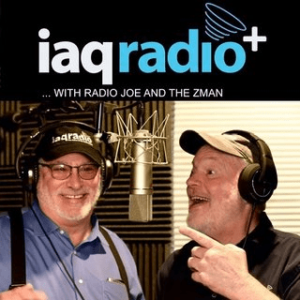
Indoor Air Quality (IAQ) Radio
Show ID: 1547
This is the place where the world discusses indoor air quality, the built environment and disaster restoration issues. Every Friday at noon ET the show is live. The shows host are Joe Hughes, President of IAQ Training Institute and Cliff Zlotnik, President of Microban Systems.
#3 - Panel style:
A style perfected on British TV with shows like “8 out of 10 cats,” “Insert Name Here” and “QI”.
All real shows. Seriously.
The panel format....a group of people come together to talk about a subject that they are all passionate about, what could be more fun than that!?! The greatest thing about this style is that there will be no shortage of content. Each person will bring their own stories, their own ideas and their own opinion to the show. The hard part will be keeping it all under control, but then again that chaotic energy can be fun.
Talkshoe style example

G.C.Community Chat With Kerry Partin
Show ID: 82757
A platform for Garden City Mi residents and surrounding areas to voice opinions, comments, and make any announcements they may have. A community forum. Join us won't you? Call now!
#2 - News/current events style:
“News is what someone wants suppressed. Everything else is advertising.”
Katharine Graham, inventor of the pop-up ad
News/current events style…This one means a lot of work. You're dealing in truth here, that can be hard to find these days. This format comes with exhaustive research, dedication to the truth and a level of diligence that only comes from a burning obsession for the subject. But it also comes with the knowledge that you are making a difference in the world, the opportunity to speak truth to power, and the satisfaction is seeing your hard work pay off.
Talkshoe style example
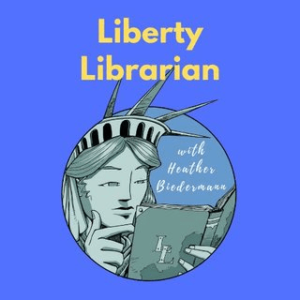
Liberty Librarian
Show ID: 9757215
Tune in for intellectual freedom news of the world and commentary. Join us Every Thursday from 3-4:30pm pacific
#1 - Repurposed content style:
“There is no new thing under the sun”
Solomon, so famous he only needs one name, like Kanye
Repurposed content style....this is an opportunity to take a look at, well, almost anything. A discerning eye on the news of yesterday. A frank study of your favourite sport before ballooning salaries ruined it all. A deep dive into the music of a band that once stood for freedom and now writes jingles for laundry soap.This is your chance to tell the world what you think about THAT. Warning, some people can be very touchy about you using their copyrighted content. Especially former hippies who now make a comfortable living writing songs about stain-lifting power. Trust me.
Talkshoe style example
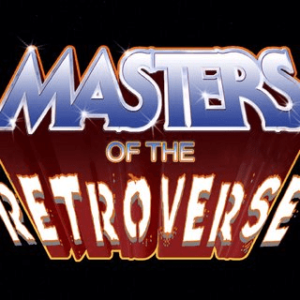
Masters of the Retroverse
Show ID: 139353
Are you a product of the 80s or 90s? Masters of the Retrovrese talks all things vintage games, movies, TV shows, toys, and pop culture in a kid friendly format.
Your Podcast Style is up to you.
Your podcast is you. And like you, it may not fit into a mould. One time it can be shocking and irreverent. The next it can be deep and contemplative. It can be open-ended and Laissez-faire one moment and be structured and formal the next. The Talkshoe format allows you to be you, and for your podcast to be anything you want.
If you’re looking to start a podcast, for free, check us out at www.Talkshoe.com!
The 7 podcasting accessories that will make your podcast better!
Getting started or looking to get better. Either way you want to give your podcast the best. Sometimes that means upgrading your equipment.Which, let’s be honest, is often the best part of any hobby. Walking around the hardware store and saying “oh the things I could build, if I had one of those” is more fun than actually building the things. So here is your chance to daydream about that perfect podcasting set up. How do you want to sound? How do you want to look? What can you find stolen and listed on Craigslist?
#7 - USB Headset, a podcasting accessory you need right now!
We’ll divide this into 2 groups, ones with a microphone built in and ones without.
 Built-in
Built-in
Can be a cheap way to get in the game (no need to spend money on seperate mic/headset
Never have to worry about the mic being too close or too far away
Cool headphones can mean a cool pic on your Tinder bio
Look at him being so productive. Actually he’s playing Galaga.
No Mic
- Less bulky headphones look sleek and stylish
- Stand alone mic will deliver superior audio quality
- Plus you can lean into the mic and say things really dramatic like ‘wake up sheeple”
Currently singing “Bulls on Parade”, hard to tell but trust me. She loves Rage Against the Machine.
For this podcasting Accessories You Need Right Now! Get something that is comfortable, and lets you hear and be heard well. Jabra makes a great headset that will deliver professional sound every time. Check it out here.
#6 - A good webcam, a podcasting accessory you need right now!
 Now you may be saying that you’re not sure if you want to use video on your podcast. How do I know if I am good looking enough for the internet, don’t worry we can help with that too. Please follow this link to a special blog posting about video podcasting.
Now you may be saying that you’re not sure if you want to use video on your podcast. How do I know if I am good looking enough for the internet, don’t worry we can help with that too. Please follow this link to a special blog posting about video podcasting.
He says “back in my day” in 3….2...
For this podcasting Accessories You Need Right Now! make sure you get at least 720P Widescreen option.
#5 - A good internet connection, a podcasting accessory you need right now!
If possible you should be hardwired to your router,but if that is not an option there are many alternatives.
How’s your neighbour’s WiFi? Connect to that. The password will be the name of their kid or dog. It always is.
There’s free WiFi at your library. Perfect if your podcast is about whispering
Live near a business? Get a job there, get the WiFi password, then quit.
Move to Estonia. There is free Internet access throughout most of the country. Don’t know where Estonia is? Google it.
Slow computer? Crack it open and look for a switch labeled fast/slow.
For this podcasting Accessories You Need Right Now! you should consider speeds around the 100–200 Mbps range.
#4 - Green Screen and software, a podcasting accessory you need right now!
Take your podcast anywhere! A green screen will let you travel the world without ever leaving your studio. Plus you can do that Harry Potter thing where you pretend to have the cloak of invisibility. Don’t pretend you wouldn’t. Everyone does that. Your first day with the green screen will just be you playing around, saying “mischief managed”. That’s worth every penny.
Plus with a cool adaptation like this (or some good tape) you can have the greenscreen only where you need it!
For this podcasting Accessories You Need Right Now! as long as the foreground is a different color than the backdrop, you can use different shades of green, or blue, or even a red screen.
#3 - External Storage, a podcasting accessory you need right now!
Yes, I know that talkshoe has “free hosting with unlimited storage”. But what about things other than your podcasts?
An MP3 of an interview you want to add to a podcast
Photos from your trip that you want to share with your co-host
That clip from The Office that makes you feel good every time you slip it in (that’s what she said!!)
You can never have too much storage.
For this podcasting Accessories You Need Right Now! Storage is like beer. Better to have it and not need it, than to need it and not have it.
#2 - studio mixer, a podcasting accessory you need right now!
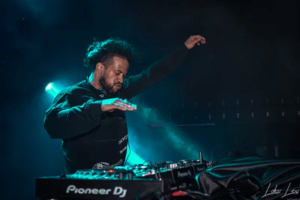 A good mixer will allow you to control and fine tune your audio, essential for any podcaster. You can combine multiple sources, balance different inputs, adjust tone, enhance sound and turn the bass way up and say “No, I am your father”. You know you wanna.
A good mixer will allow you to control and fine tune your audio, essential for any podcaster. You can combine multiple sources, balance different inputs, adjust tone, enhance sound and turn the bass way up and say “No, I am your father”. You know you wanna.
Yes, you will look as cool as this. Guaranteed.
For this podcasting Accessories You Need Right Now! pay attention to connection types. In addition to knowing the kinds of connections you will need, pay attention to how many you will need as well.
#1 - New Computer Chair, a podcasting accessory you need right now!
You are going to be spending a lot of time sitting down, even more than you do already, so you need a good chair. This is not the place to cheap out. Sure you could sit in an old kitchen chair, but you deserve the best. The best is the Xten Office Chair by Pininfarina. It is without equal in this world or any other. The Xten uses the most advanced ergonomic knowledge, combined with designer Sergio Pininfarina’s lifelong dedication to buttock support. Sergio has spent his life studying the proper support, the correct cushioning and gentle massaging of the human derrière. At only 1.5 million dollars each, it is a steal. Order yours today.
Or use one of these. They are free on garbage day.
For this podcasting Accessories You Need Right Now! Think about your lumbar. Slouching can strain the structures in the lumbar spine.
Ask Yourself, Am I Incorporating All The Right Strategies?
Maybe your company just started a branded podcast, or has been producing one for a while. Whichever the case, a common thing we hear at Talkshoe is that people aren’t familiar with how to effectively promote their podcast on social media. You feel that the content is interesting, and relevant for your brand’s audience, but are still unsure of how to execute the promotional aspect. As a long running podcasting platform we’ve seen many success stories. The good news is that it may only take some minor tinkering to your social media strategy for you to see those numbers greatly improve. Let us help you out.
Promotion, Promotion, and More Promotion...Did We Mention Promotion?
It’s great that you recorded your podcast and shared it out on all the major social media platforms (Twitter, Instagram, Facebook). But the real question is, for EACH episode how many posts did you make, and to what extent are they varied posts? These are important questions to ask because studies have shown that the majority of podcast downloads are done in the first 4 days of posting. So you want to take advantage of that time frame. Here are some tips about how to optimally socialize each branded podcast episode.
Socialize the fact that you're working on the podcast before the release date.
This can include an announcement of a guest who is scheduled to come in or even a behind the scenes look at the actual recording of the podcast before release. Perfect for Instagram stories!
Reshare the branded podcast episode throughout the week after release.
Obviously you don’t want to overload your feed with promotions since that can come across as tacky. But 2-4 times on Twitter and 2-3 times on Facebook and Instagram during the week that the podcast goes live is deemed good practice. Remember, that doesn’t include the pre-promotion you did beforehand!
Different Types Of Posts You Use On Social Media
It’s important that your images don't all look the same and comprise elements that would draw attention to them. Below are the ideal types of images to accompany your promotional posts.
Audiograms
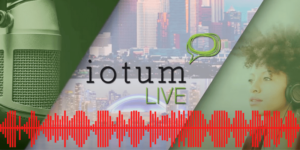 Widely considered to be the most effective type of promotion for branded podcasts, audiograms contain a snippet of your episode with an audio wave moving on top of your branded image. As it is not static, this graphic greatly helps grab people's attention on social media. There are websites that allow you to make them for free. Here is popular site that give you 10 free audiograms a month:
Widely considered to be the most effective type of promotion for branded podcasts, audiograms contain a snippet of your episode with an audio wave moving on top of your branded image. As it is not static, this graphic greatly helps grab people's attention on social media. There are websites that allow you to make them for free. Here is popular site that give you 10 free audiograms a month:
Image Quotes
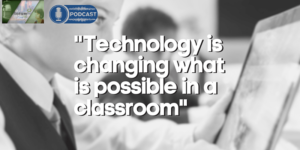 Simple but powerful. This is a quote that you place as text on an image relating to your podcast. It immediately gives listeners insight into the episode's topic. Being that your podcast is branded, it will quickly attract lthe ike-minded people that you are targeting!
Simple but powerful. This is a quote that you place as text on an image relating to your podcast. It immediately gives listeners insight into the episode's topic. Being that your podcast is branded, it will quickly attract lthe ike-minded people that you are targeting!
Videos:
If you recorded your podcast on video as well, use that as another promotional tool. Whether it’s a YouTube podcast or not, all major social media platforms allow you to post videos on their platform. Thus, this proves to be a very effective method to draw attention.
Upload Your Podcast To All Major Platforms.
Lastly, it is important to have your branded podcast episode hosted on as many listening platforms as you can. These include Apple Podcasts, Spotify, Google Play, to name a few. People have preferences towards how they consume their content soo when you can promote on multiple platforms you will appeal to a larger potential audience.
Being an all-in-one podcasting platform, Talkshoe.com not only records but also distributes podcasts to the masses. Leverage the One Click-Import feature for FREE with Talkshoe.com, and have your podcast automatically populate on multiple podcast hosting platforms simultaneously and with ease.
Read more about the one click import feature here:
If you’re looking to start a podcast, for free, check us out at www.Talkshoe.com!
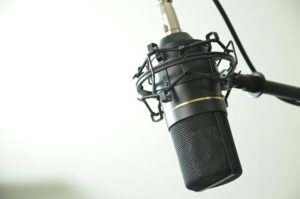
Two often overlooked aspects of your podcast are the intro and outro. These pieces are so important to the success of your podcast as they are what pulls your listeners in initially and ensures that they come back for more. To make sure that you are capitalizing on this time, we have created this guide on how to carefully craft these two components.
The intro
The introduction to each new podcast episode is crucially important for pulling your audience in and holding their interest. This is especially so for first-time listeners who may not be familiar with your content and are shopping around for a new show to dive into. Here are a few tips on how to craft yours:
· Make it personal. Start by introducing yourself to your listeners and welcoming them to the show. Many hosts like to thank their audience for tuning in so that they know that their time is appreciated.
· Mention who the podcast is for. As the podcast’s host, you know your target demographic well and what types of people will find your content most appealing. Mentioning this will let first-time listeners know whether or not they are in the right place.
· Briefly introduce your podcast and what will be covered in this episode. This is where you will sell the episode to your listeners so make sure that your overview quickly touches on all of the most interesting aspects. Think about why your specific demographic finds your podcast intriguing and tell them how this episode’s content will engage them.
The outro
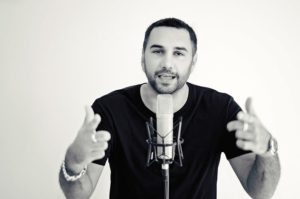 If your listener has made it this far, it is likely that they have enjoyed your content and would be willing to tune in again. Capitalize on this momentum by using these tips to make the journey back easy for them:
If your listener has made it this far, it is likely that they have enjoyed your content and would be willing to tune in again. Capitalize on this momentum by using these tips to make the journey back easy for them:
- Suggest that they connect with you. Start by mentioning one or two places that listeners can connect with you outside of the show. This could be through social media, email, your website, etc. Make sure to say it clearly and spell it out if necessary.
- Use a call-to-action. Since you don’t want to ask for too much from your audience, choose one action that you would like them to take at this point. This could include asking them to subscribe or leave a rating for your podcast. It could also be as simple as suggesting they tell a friend to check out the show out as well. If you need inspiration, check out this article on how to craft the perfect message for your show.
- Thank them for listening. Again, it’s just polite.
Final suggestions
 Since these two sections of your podcast are incredibly important, many hosts choose to script them to ensure that all pertinent information is included. It can be easy to forget to mention your Instagram handle or ask your listeners to hit the subscribe button when you’re caught up in the moment.
Since these two sections of your podcast are incredibly important, many hosts choose to script them to ensure that all pertinent information is included. It can be easy to forget to mention your Instagram handle or ask your listeners to hit the subscribe button when you’re caught up in the moment.
Another strategy is to record both the intro and outro after the fact. This way, you are able to tailor your overview to what actually ends up being said. As you are recording, things can go off in directions that you weren’t initially expecting, and this method will allow you to incorporate these new aspects.
You’re ready to record!
Now that you are ready to make a lasting impression on your listeners, why not do it through TalkShoe and take advantage of the amazing FREE services that we offer? The platform allows you to record and stream your podcast live from anywhere. With unlimited hosting and storage, TalkShoe makes it easy so that all you have to worry about is creating your content.
Live in Toronto? You can come down to our state-of-the-art studio inside Stackt Market and record an episode here with us!
 If you have been invited to be a guest on someone’s podcast, you should be incredibly flattered! Whether you’re an expert in your field, bring a fresh perspective to the table, or have opinions you’re willing to share, this is a great opportunity for you to get your voice heard. Although you might think that the host is the only one who should be preparing, doing your part as the guest to contribute will certainly lead to a more memorable recording. Follow these 3 steps to ensure that you leave a lasting impression on your host and your audience.
If you have been invited to be a guest on someone’s podcast, you should be incredibly flattered! Whether you’re an expert in your field, bring a fresh perspective to the table, or have opinions you’re willing to share, this is a great opportunity for you to get your voice heard. Although you might think that the host is the only one who should be preparing, doing your part as the guest to contribute will certainly lead to a more memorable recording. Follow these 3 steps to ensure that you leave a lasting impression on your host and your audience.
Step 1: Do your homework
 The host may or may not choose to share their interview questions with you beforehand. If they do, use this as an opportunity to determine how best to answer them. In our previous blog post, we discuss how to decide whether or not you should script your content, and this may be useful to review when planning your responses.
The host may or may not choose to share their interview questions with you beforehand. If they do, use this as an opportunity to determine how best to answer them. In our previous blog post, we discuss how to decide whether or not you should script your content, and this may be useful to review when planning your responses.
If the host does not provide you with interview questions, it is likely that you have a general idea of the subject matter that you will be discussing. Take some time to think through how you wish to present yourself and your ideas, and even jot down some notes if you feel that it will be helpful. If required, do a bit of extra research on the topic to make sure that you come off sounding both prepared and professional.
Step 2: Prep your recording space
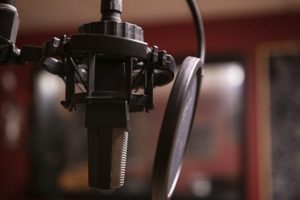 If you will be recording your episode in the same location as your host, you can skip over this section. However, if getting together in person is not possible and you will be connecting remotely (as can be done online with the TalkShoe platform), it is important that you prepare the space that you will be recording in for the best sounding audio.
If you will be recording your episode in the same location as your host, you can skip over this section. However, if getting together in person is not possible and you will be connecting remotely (as can be done online with the TalkShoe platform), it is important that you prepare the space that you will be recording in for the best sounding audio.
When selecting your location:
· Choose the quietest space that you can
· Avoid public places or anywhere with excessive background noise
· If recording at home, a carpeted room is best to reduce echo
· If necessary, kindly inform neighbours in advance so they can reduce their noise during this time
Step 3: Get your gear
Using an external microphone is ideal and doesn’t have to break the bank. The Samson
Portable Go Mic costs only $30 and is a great option for the occasional podcaster. If this is a one-time endeavor, TalkShoe allows you to use either your mobile device or computer mic to record with. Make sure you have everything set up in advance so you’re not scrambling on the day of recording.
You’re ready to go
If you have followed these steps, you are now ready to make a memorable podcast appearance! If you want any extra advice on vocal delivery strategies, check out the tips and tricks from our previous blog post. Although this might seem like a lot of pressure, don’t be nervous! You’re going to do great.
 As someone who regularly engages with new and first-time podcasters, I am frequently asked how much preparation should be done before hitting record. Often, these inquiries include a question about scriptwriting. Should episodes be completely scripted to ensure that material is covered as intended? Or, should they be recorded on-the-fly to sound more natural?
As someone who regularly engages with new and first-time podcasters, I am frequently asked how much preparation should be done before hitting record. Often, these inquiries include a question about scriptwriting. Should episodes be completely scripted to ensure that material is covered as intended? Or, should they be recorded on-the-fly to sound more natural?
Personally, I recommend a combination of both. However, there are pros and cons to each and as a podcast host, you will have to determine what works best for you. Read on for a more in-depth look at each of these methods.
Entirely Scripted
Using this option, the podcast host prepares all of their content in advance and reads from a script during their recording. The benefit of having an entirely scripted episode is that your content will be covered exactly as intended. You will never need to worry about forgetting an important piece of information, or trying to properly articulate your thoughts. If you’re finding this process a bit challenging, try checking out Quill, an online service that can match you up with a professional script writer who is perfect for you and your podcast.
The downside to following a script is that your recordings may SOUND scripted to your listeners who are expecting a more natural flow of conversation. If you do feel most comfortable using this method, I recommend practicing your content out loud several times before hitting record. Making notes in your script about specific inflections to use or where to insert a pause can be helpful as well.
On-the-fly
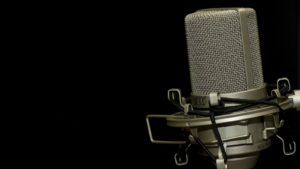 For those who are confident in their ability to think on their feet, the completely unscripted option is the right choice for you. One of the benefits is that your content does not come across as forced or monotone. It also leaves room for spontaneous inspiration and discussion during the podcast.
For those who are confident in their ability to think on their feet, the completely unscripted option is the right choice for you. One of the benefits is that your content does not come across as forced or monotone. It also leaves room for spontaneous inspiration and discussion during the podcast.
An obvious risk that you take with this method is forgetting what you wanted to say. As thoroughly as you might know a topic, it is easy to miss something when you’re caught up in the moment. Because of this, my advice is always to jot down a few main points that you wish to discuss. You will be glad that you have it if you find your mind going blank in the middle of a recording. If it does, don’t feel bad! It happens to the best of us.
 The Basic Episode Plan
The Basic Episode Plan
The approach that I have settled on is a combination of the two methods. Before I record an episode, I create an outline of the main points that I wish to discuss and list them in an order that makes sense. The benefit of this method is that you will cover all intended material and still sound natural and conversational.
Focus on content – We’ll take care of the rest!
Here at TalkShoe, we know how much work goes into each and every episode that you record. Because of that, we are proud to offer a podcasting platform that eliminates much of the heavy lifting. With FREE unlimited hosting and storage, easy to use RSS feeds, and lots of cool extras, the TalkShoe platform lets you focus on the most important aspect – your content.

 >Currently the co-host of Canada's biggest drive home talk radio show #TheRush on Newstalk1010 in Toronto. Jay “Mad Dog” Michaels is a celebrated Toronto radio veteran, who has dominated ratings with the biggest stations, and was twice voted "favourite Toronto radio personality." So if your favourite actor or musician or newsmaker has been on air in Toronto, they have probably chatted with Mad Dog. We are privileged to have him join us for an interview about interviews.
>Currently the co-host of Canada's biggest drive home talk radio show #TheRush on Newstalk1010 in Toronto. Jay “Mad Dog” Michaels is a celebrated Toronto radio veteran, who has dominated ratings with the biggest stations, and was twice voted "favourite Toronto radio personality." So if your favourite actor or musician or newsmaker has been on air in Toronto, they have probably chatted with Mad Dog. We are privileged to have him join us for an interview about interviews. They are talking to you for a reason, get to it.
They are talking to you for a reason, get to it. So often people are conducting an interview and they're so concerned about getting the questions right and they're not really listening to the answers. What I tend to do is, I'll just write down an intro and then four or five questions. I may only use the first question. I might get to all five questions. But only by listening can I know which question should be next. Or if I should ask a follow up question that maybe I didn’t write. Yeah, an interview is bad because someone isn’t listening or is not prepared.
So often people are conducting an interview and they're so concerned about getting the questions right and they're not really listening to the answers. What I tend to do is, I'll just write down an intro and then four or five questions. I may only use the first question. I might get to all five questions. But only by listening can I know which question should be next. Or if I should ask a follow up question that maybe I didn’t write. Yeah, an interview is bad because someone isn’t listening or is not prepared. Stick to “who” and “what”.
Stick to “who” and “what”.


 Get away from the prepared answers
Get away from the prepared answers The number one most common mistake is not listening. A lot of people come up with their long list of questions, they ask the question and they wait for the person to finish answering and they move onto the next question. That seems like a good idea, but you miss so much opportunity if you're not listening carefully. If you ask your first question and while answering they say something that you weren't expecting, that can be a really fun opportunity. That answer could lead to something brand new that you didn't know, or maybe nobody knows, but if you're not listening to those answers you could miss it. Be brave. Go away from your script.
The number one most common mistake is not listening. A lot of people come up with their long list of questions, they ask the question and they wait for the person to finish answering and they move onto the next question. That seems like a good idea, but you miss so much opportunity if you're not listening carefully. If you ask your first question and while answering they say something that you weren't expecting, that can be a really fun opportunity. That answer could lead to something brand new that you didn't know, or maybe nobody knows, but if you're not listening to those answers you could miss it. Be brave. Go away from your script. It can all be fixed in the editing suite
It can all be fixed in the editing suite


 Leaving them asking, How?
Leaving them asking, How? Talk about what you know
Talk about what you know







 Built-in
Built-in Now you may be saying that you’re not sure if you want to use video on your podcast. How do I know if I am good looking enough for the internet, don’t worry we can help with that too. Please follow this
Now you may be saying that you’re not sure if you want to use video on your podcast. How do I know if I am good looking enough for the internet, don’t worry we can help with that too. Please follow this  A good mixer will allow you to control and fine tune your audio, essential for any podcaster. You can combine multiple sources, balance different inputs, adjust tone, enhance sound and turn the bass way up and say “No, I am your father”. You know you wanna.
A good mixer will allow you to control and fine tune your audio, essential for any podcaster. You can combine multiple sources, balance different inputs, adjust tone, enhance sound and turn the bass way up and say “No, I am your father”. You know you wanna. Widely considered to be the most effective type of promotion for branded podcasts, audiograms contain a snippet of your episode with an audio wave moving on top of your branded image. As it is not static, this graphic greatly helps grab people's attention on social media. There are websites that allow you to make them for free. Here is popular
Widely considered to be the most effective type of promotion for branded podcasts, audiograms contain a snippet of your episode with an audio wave moving on top of your branded image. As it is not static, this graphic greatly helps grab people's attention on social media. There are websites that allow you to make them for free. Here is popular  Simple but powerful. This is a quote that you place as text on an image relating to your podcast. It immediately gives listeners insight into the episode's topic. Being that your podcast is branded, it will quickly attract lthe ike-minded people that you are targeting!
Simple but powerful. This is a quote that you place as text on an image relating to your podcast. It immediately gives listeners insight into the episode's topic. Being that your podcast is branded, it will quickly attract lthe ike-minded people that you are targeting!
 If your listener has made it this far, it is likely that they have enjoyed your content and would be willing to tune in again. Capitalize on this momentum by using these tips to make the journey back easy for them:
If your listener has made it this far, it is likely that they have enjoyed your content and would be willing to tune in again. Capitalize on this momentum by using these tips to make the journey back easy for them: Since these two sections of your podcast are incredibly important, many hosts choose to script them to ensure that all pertinent information is included. It can be easy to forget to mention your Instagram handle or ask your listeners to hit the subscribe button when you’re caught up in the moment.
Since these two sections of your podcast are incredibly important, many hosts choose to script them to ensure that all pertinent information is included. It can be easy to forget to mention your Instagram handle or ask your listeners to hit the subscribe button when you’re caught up in the moment. If you have been invited to be a guest on someone’s podcast, you should be incredibly flattered! Whether you’re an expert in your field, bring a fresh perspective to the table, or have opinions you’re willing to share, this is a great opportunity for you to get your voice heard. Although you might think that the host is the only one who should be preparing, doing your part as the guest to contribute will certainly lead to a more memorable recording. Follow these 3 steps to ensure that you leave a lasting impression on your host and your audience.
If you have been invited to be a guest on someone’s podcast, you should be incredibly flattered! Whether you’re an expert in your field, bring a fresh perspective to the table, or have opinions you’re willing to share, this is a great opportunity for you to get your voice heard. Although you might think that the host is the only one who should be preparing, doing your part as the guest to contribute will certainly lead to a more memorable recording. Follow these 3 steps to ensure that you leave a lasting impression on your host and your audience. The host may or may not choose to share their interview questions with you beforehand. If they do, use this as an opportunity to determine how best to answer them. In our previous
The host may or may not choose to share their interview questions with you beforehand. If they do, use this as an opportunity to determine how best to answer them. In our previous  If you will be recording your episode in the same location as your host, you can skip over this section. However, if getting together in person is not possible and you will be connecting remotely (as can be done online with the
If you will be recording your episode in the same location as your host, you can skip over this section. However, if getting together in person is not possible and you will be connecting remotely (as can be done online with the  As someone who regularly engages with new and first-time podcasters, I am frequently asked how much preparation should be done before hitting record. Often, these inquiries include a question about scriptwriting. Should episodes be completely scripted to ensure that material is covered as intended? Or, should they be recorded on-the-fly to sound more natural?
As someone who regularly engages with new and first-time podcasters, I am frequently asked how much preparation should be done before hitting record. Often, these inquiries include a question about scriptwriting. Should episodes be completely scripted to ensure that material is covered as intended? Or, should they be recorded on-the-fly to sound more natural? For those who are confident in their ability to think on their feet, the completely unscripted option is the right choice for you. One of the benefits is that your content does not come across as forced or monotone. It also leaves room for spontaneous inspiration and discussion during the podcast.
For those who are confident in their ability to think on their feet, the completely unscripted option is the right choice for you. One of the benefits is that your content does not come across as forced or monotone. It also leaves room for spontaneous inspiration and discussion during the podcast. The Basic Episode Plan
The Basic Episode Plan